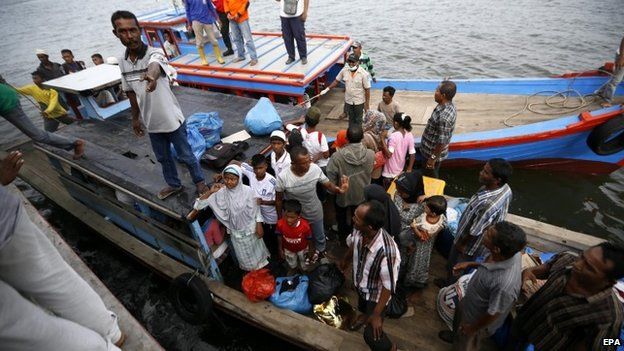Migrant crisis: Indonesia begins search and rescue
- Published

Indonesia has begun search and rescue missions for the thousands of migrants believed to be adrift in its waters.
The country had initially been fending off boats but has since agreed to provide them with temporary shelter.
Over 3,000 people, mostly Bangladeshi or Rohingya Muslims from Myanmar, have arrived in Indonesia, Malaysia and Thailand in the past two weeks.
The UN Secretary-General, Ban Ki-moon, has called on South-East Asian nations to do more to protect migrants.
"It's important to save human lives. Whatever the reasons may be when they are out on the sea, their life is endangered," Mr Ban said in a speech in Vietnam.
The Indonesian operation covers their territorial waters and beyond, although they have not yet found any migrant boats.
"If they [the rescuers] see Rohingya boats experiencing various troubles beyond our territory, we have to help so that they can enter Indonesian territory, which initially I did not want to do," said General Moeldoko, the head of Indonesia's Armed Forces.
"But with the president's order, it is very clear we have to do it."
Myanmar and Malaysia launched similar operations on Friday. Thailand only said it would stop rejecting boats.
Myanmar (also known as Burma) has carried out its first rescue, finding more than 200 people they described as Bengalis crammed into the hull of a fishing boat.
Officials said the men would be deported to Bangladesh, with the country insisting only verified Myanmar citizens will be allowed to stay.
- Rohingya Muslims mainly live in Myanmar - largely in Rakhine state - where they are not considered citizens and have faced decades of persecution.
- Rights groups say migrants feel they have "no choice" but to leave, paying people-smugglers to help them. The UN estimates more than 120,000 Rohingyas have fled in the past three years.
- Also on board are economic migrants, mainly from Bangladesh, seeking a better life.
- Traffickers usually take the migrants by sea to Thailand then overland to Malaysia, often holding them hostage until their relatives pay ransoms.
- But Thailand recently began cracking down on the migrant routes, meaning traffickers are using sea routes instead, often abandoning their passengers en route.
Are you or is someone you know affected by the issues in this story? Email your experiences to haveyoursay@bbc.co.uk
You can message us on WhatsApp 07525 900971.